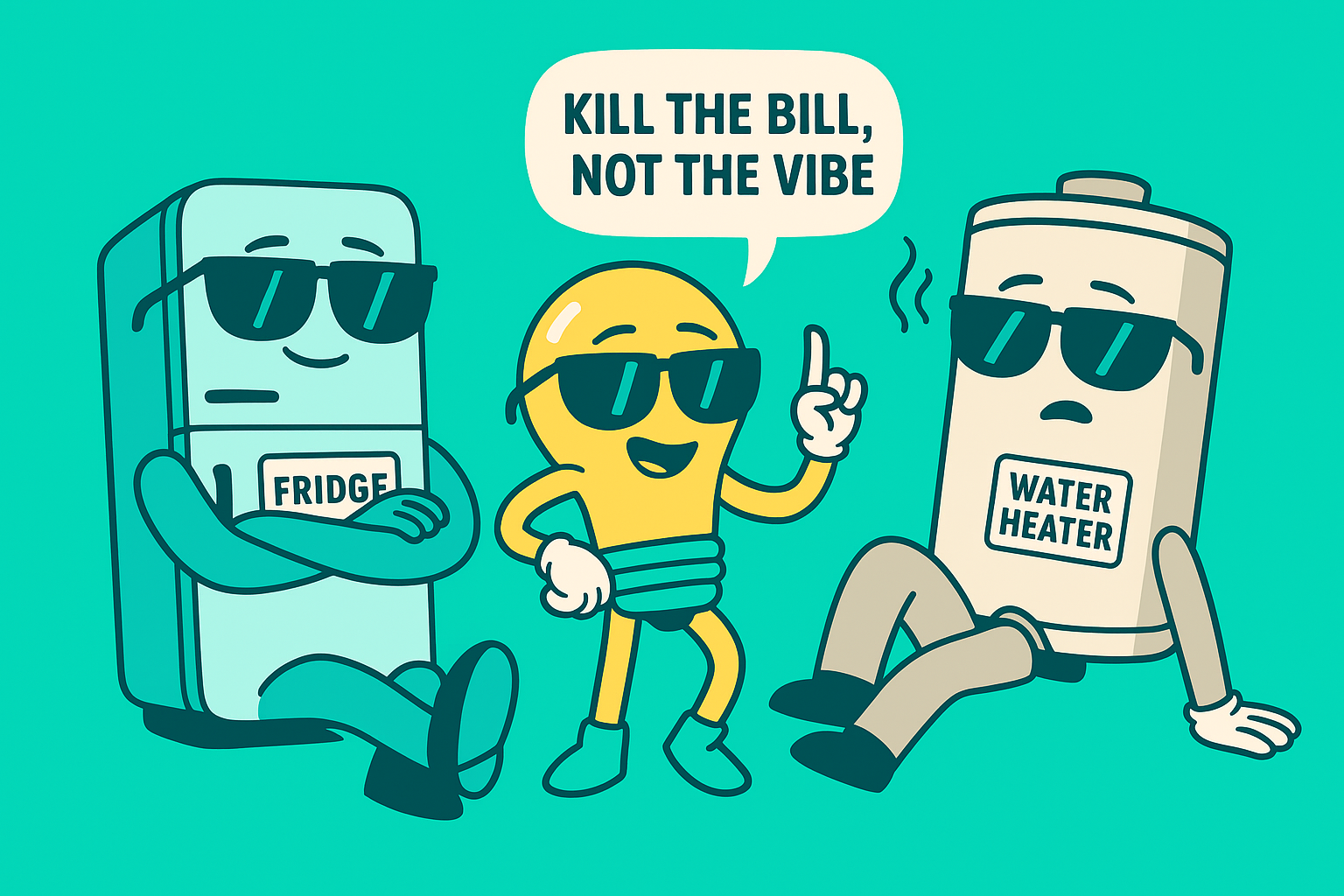Are you tired of seeing that sky-high electricity bill every month? 😫 You’re not alone. Many homeowners struggle with rising energy costs, but the good news is there are plenty of easy, practical ways to cut down on your electric bill – without sacrificing comfort. Whether you’re looking for energy-saving tips or wondering how to lower your electricity bill, this guide has you covered with 15 actionable strategies. 🔥
Join MoneyLion and start budgeting better today with MoneyLion’s free budgeting tools!
Table of contents

1. Switch to LED bulbs
LED bulbs use up to 75% less energy than traditional incandescent lights and last significantly longer. 💰 The upfront cost may be higher, but these bulbs will save you money and help reduce energy consumption over time. Plus, they give off less heat, making them perfect for reducing your cooling costs in the summer.
2. Adjust thermostat settings
Lowering your thermostat by just a few degrees in the winter or raising it in the summer can make a noticeable difference in your electric bill. Better yet, install a programmable thermostat that automatically adjusts the temperature based on when you’re home or asleep. This small change can significantly lower your heating and cooling costs.
3. Unplug unused electronics
Even when turned off, plugged-in electronics can continue to draw power – a phenomenon known as “phantom energy.” You can reduce energy consumption and save money by simply unplugging devices like your TV, chargers and kitchen appliances when they’re not in use.
4. Use energy-efficient appliances
Investing in energy-efficient appliances can lead to significant savings over time. Look for the Energy Star label when purchasing new appliances, as these use less energy without compromising performance. Although the upfront cost might be higher, the long-term savings are worth it.
5. Seal cracks and gaps in windows and doors
Tiny cracks around windows and doors can let out heated or cooled air, causing your HVAC system to work overtime. Seal these gaps with weather stripping or caulking to make your home more energy-efficient. This simple fix will prevent your system from overworking and help you save on your electric bill.
6. Use fans instead of AC
Fans use significantly less energy than air conditioning units. Use fans to circulate air on mild days rather than cranking up the AC. This can drastically cut down your electricity usage without sacrificing comfort.
7. Improve insulation
Good insulation reduces heat transfer, keeping your home cool in the summer and warm in the winter. If your home is poorly insulated, your HVAC system will have to work harder to maintain the desired temperature, driving up your electric bill. Investing in better insulation is a great long-term strategy for saving on utilities.
8. Use natural light when possible
Natural light is free! Use daylight by opening blinds and curtains during the day instead of relying on artificial lighting. This simple switch reduces your energy usage and creates a more pleasant, naturally lit environment.
9. Run full loads of laundry or dishes
Always wait until you have a full load before running your dishwasher or washing machine. These appliances consume the same amount of energy whether they’re full or not, so make the most of each cycle to reduce usage.
10. Use power strips for electronics
Plugging your electronics into a power strip makes cutting off the power completely easier when they’re not in use. This prevents devices from drawing energy even when turned off and helps you avoid phantom energy waste.
11. Take shorter showers
Water heaters account for a significant portion of your electric bill and shorter showers mean using less hot water. Try setting a timer or installing a low-flow showerhead to reduce water usage and lower your electricity costs.
12. Turn off lights when leaving a room
This might seem like a no-brainer, but it’s one of the easiest ways to save. Make a habit of turning off lights when you leave a room. Consider installing motion sensors in rooms where lights are often left on unnecessarily for even more savings.
13. Switch to a laptop instead of a desktop PC
Laptops are much more energy-efficient than desktop computers. If possible, switch to using a laptop for everyday tasks and only use your desktop when absolutely necessary.
14. Schedule an energy audit
An energy audit can help identify areas where you’re wasting electricity in your home. Many utility companies offer free or low-cost energy audits to pinpoint problem areas and suggest ways to reduce energy consumption.
15. Consider solar panels
If you’re looking for a long-term solution to how to lower your electricity bill, solar panels can be a game-changer. While they require an initial investment, the potential savings – and even earning credits for unused energy – can make solar panels a smart choice for many homeowners.
Keep Energy Costs in Check Without Sacrificing Comfort
Lowering your electric bill doesn’t mean you have to live in the dark or swelter through the summer. By following these energy-saving tips, you can enjoy the comfort of your home without dreading your utility bill. Whether reducing energy consumption with LED bulbs or considering solar panels for the future, each step adds significant savings over time. Start implementing these tips today and watch your energy costs drop. 🔋💸
FAQs
What runs your electric bill up the most?
Heating and cooling systems are the biggest energy hogs, especially in extreme weather. Appliances like refrigerators and water heaters also contribute significantly.
Does a TV use a lot of electricity?
TVs use electricity, but compared to appliances like heaters or AC units, they’re relatively low-energy users. Unplugging when not in use can still help with how to save on utilities.
Do you save electricity by unplugging?
Yes, unplugging electronics stops them from drawing “phantom” energy, which can add up over time.










